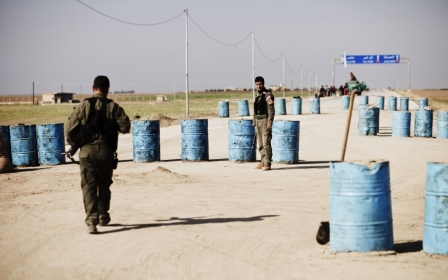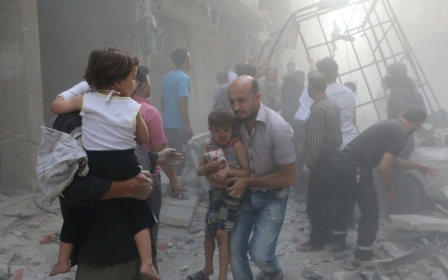Syria arrests pro-Assad activists over state criticism

Five Syrian pro-government activists have been arrested for criticising the intelligence services and defence ministry over the loss of key military bases and the deaths of soldiers, an NGO said Tuesday.
Rami Abdel Rahman, director of the Syrian Observatory for Human Rights, said they were arrested on Friday "after criticising the role of the defence ministry and the intelligence services in the loss of key bases in the north, particularly the Tabqa military airport."
The five men are all members of the minority Alawite sect to which President Bashar al-Assad belongs.
Four were arrested in the coastal cities of Latakia and Tartus, strongholds of Assad and the Alawite community, and a fifth in Damascus.
The four from Latakia and Tartus had sought to organise demonstrations against Defence Minister General Fahd al-Freij, but were detained before they took place, Abdel Rahman said.
The fifth, Mudar Khadur, was arrested in Damascus after launching a social media campaign calling for information on the fate of soldiers at bases overrun by militants.
Militants from the Islamic State (IS) seized three bases in northern Raqa province in July and August, killing dozens of soldiers.
Khadur launched the "Eagles of Tabqa Military Airport" Facebook page to rally support for troops as they came under attack, and then the #Waynun or #WhereAreThey campaign after Tabqa was captured.
The page and campaign included direct criticism of defence minister Freij, with postings referring to him as "Minister of Death" and expressions of anger at his reappointment in late August.
"These men were not opponents of Bashar al-Assad," Abdel Rahman said.
"But they were angered by the lack of explanations about how these well-protected bases could have fallen so quickly and the large number of deaths," he said.
Khadur's arrest was also reported on the "Eagles of Tabqa Military Airport" Facebook page.
"Not a traitor, not an agent, not a terrorist," one posting reads.
"He was arrested by the air force intelligence on the evening of August 29, 2014 in Damascus."
According to the Observatory, at least 2,366 Syrian soldiers were killed in July and August alone, more than 800 of them in militant attacks, with others still missing.
Tens of thousands of people are being held in Syrian prisons, according to the Observatory, many of them activists seeking the ouster of the autocratic government.
'Unprecedented' Syrian strikes on Jubar district
Syrian warplanes pounded the rebel Jubar district of the capital Damascus with unprecedented ferocity on Tuesday, launching 25 raids.
"It's the largest number of air raids to hit Jubar since the beginning of the army offensive on the district" six days ago, said Rami Abdel Rahman.
Jubar is in eastern Damascus and has been in rebel hands for a year.
It is considered a strategic position because it leads onto the adjacent Abbasid Place in central Damascus and also opens onto the key rebel stronghold of Eastern Ghouta in Damascus province.
Government forces have been attacking Jubar since last week, with troops backed by fighters from Lebanon's Shiite Hezbollah movement, an Assad ally.
The offensive is the biggest against Jubar since rebels seized the neighbourhood in mid-2013.
The district has largely been emptied of civilians by fighting, but Abdel Rahman said "dozens of rebels have been killed" in the onslaught, although he had no more precise figures.
The attack has used warplanes, as well as artillery and Iranian ground-to-ground missiles.
Syrian soldiers and Hezbollah fighters are currently deployed around the outskirts of the neighbourhood, but have not managed to enter despite the heavy bombardment, Abdel Rahman said.
In mid-August, the army seized the Mleiha area, 10 kilometres (six miles) southeast of Damascus, and it is hoping that a capture of Jubar would allow it to launch a double-pronged assault on Eastern Ghouta.
According to the Observatory, at least 180,000 people have been killed since the beginning of the conflict in March 2011.
Middle East Eye propose une couverture et une analyse indépendantes et incomparables du Moyen-Orient, de l’Afrique du Nord et d’autres régions du monde. Pour en savoir plus sur la reprise de ce contenu et les frais qui s’appliquent, veuillez remplir ce formulaire [en anglais]. Pour en savoir plus sur MEE, cliquez ici [en anglais].




